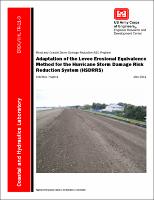Please use this identifier to cite or link to this item:
https://hdl.handle.net/11681/7717| Title: | Adaptation of the levee erosional equivalence method for the hurricane storm damage risk reduction system (HSDRRS) |
| Authors: | Hughes, Steven A. |
| Keywords: | Erosional equivalence Excess work Levee erosion Levees Overtopping duration Resiliency Steady overflow Wave overtopping |
| Publisher: | Coastal and Hydraulics Laboratory (U.S.) Engineer Research and Development Center (U.S.) |
| Series/Report no.: | ERDC/CHL TR ; 11-3. |
| Description: | Technical report This report describes a rational methodology for evaluating the strength and resiliency of earthen levees against wave overtopping forces during hurricanes. The new methodology was developed by extending Dean, et al.’s (2010) concept of “cumulative excess work,” which hypothesized that damage to grass-covered slopes is caused by cumulative work done by the overtopping waves in excess of some tolerable level. The erosional equivalence method is able to account for the fact that (1) earthen levees can tolerate certain levels of wave overtopping without any soil erosion, (2) earthen levees can survive some duration of increased wave overtopping with allowable erosion, and (3) earthen levees will eventually suffer slope damage if the overtopping level is high and overtopping duration is sufficiently long. A predictive capability for estimating the cumulative excess wave volume (or excess work) as a function of time for prescribed wave, surge, and levee parameters was developed for the cases of wave-only overtopping, combined wave and surge overtopping, and realistic storms with time-varying parameters. Application of the methodology is illustrated by worked examples. The erosional equivalence methodology provides a useful (but perhaps conservative) tool for comparative analyses of different reaches of the HSDRRS to identify which reaches would benefit from additional slope armoring. |
| Rights: | Approved for public release; distribution is unlimited. |
| URI: | http://hdl.handle.net/11681/7717 |
| Appears in Collections: | Technical Report |
Files in This Item:
| File | Description | Size | Format | |
|---|---|---|---|---|
| CHL-TR-11-3.pdf | 3.86 MB | Adobe PDF |  View/Open |